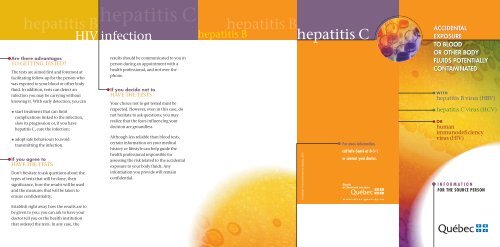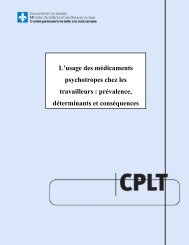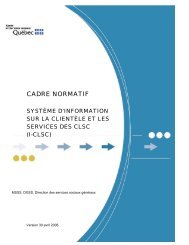Accidental Exposure to Blood or Other Body Fluids potentially ...
Accidental Exposure to Blood or Other Body Fluids potentially ...
Accidental Exposure to Blood or Other Body Fluids potentially ...
- No tags were found...
Create successful ePaper yourself
Turn your PDF publications into a flip-book with our unique Google optimized e-Paper software.
hepatitis BAre there advantagesTO GETTING TESTED?The tests are aimed first and f<strong>or</strong>emost atfacilitating follow-up f<strong>or</strong> the person whowas exposed <strong>to</strong> your blood <strong>or</strong> other bodyfluid. In addition, tests can detect aninfection you may be carrying withoutknowing it. With early detection, you canstart treatment that can limitcomplications linked <strong>to</strong> the infection,slow its progression <strong>or</strong>, if you havehepatitis C, cure the infection;adopt safe behaviours <strong>to</strong> avoidtransmitting the infection.If you agree <strong>to</strong>HAVE THE TESTSDon't hesitate <strong>to</strong> ask questions about thetypes of tests that will be done, theirsignificance, how the results will be usedand the measures that will be taken <strong>to</strong>ensure confidentiality.hepatitis CHIV infectionresults should be communicated <strong>to</strong> you inperson during an appointment with ahealth professional, and not over thephone.If you decide not <strong>to</strong>HAVE THE TESTSYour choice not <strong>to</strong> get tested must berespected. However, even in this case, donot hesitate <strong>to</strong> ask questions; you mayrealize that the fears influencing yourdecision are groundless.Although less reliable than blood tests,certain inf<strong>or</strong>mation on your medicalhis<strong>to</strong>ry <strong>or</strong> lifestyle can help guide thehealth professional responsible f<strong>or</strong>assessing the risk related <strong>to</strong> the accidentalexposure <strong>to</strong> your body fluids. Anyinf<strong>or</strong>mation you provide will remainconfidential.hepatitis Bhepatitis B hepatitis CF<strong>or</strong> m<strong>or</strong>e inf<strong>or</strong>mation,call Info-Santé at 8-1-1<strong>or</strong> contact your doc<strong>to</strong>r.ACCIDENTALEXPOSURETO BLOODOR OTHER BODYFLUIDS POTENTIALLYCONTAMINATEDWITHhepatitis B virus (HBV)hepatitis C virus (HCV)ORhumanimmunodeficiencyvirus (HIV)I N F O R M A T I O NFOR THE SOURCE PERSONEstablish right away how the results are <strong>to</strong>be given <strong>to</strong> you: you can ask <strong>to</strong> have yourdoc<strong>to</strong>r tell you <strong>or</strong> the health institutionthat <strong>or</strong>dered the tests. In any case, the01-338-0213-338-02A © Gouvernement du Québec, 2013w w w . m s s s . g o u v . q c . c a
hepatitis CHIV infectionhepatitis Bhepatitis BHIV infectionhepatitis CSomeone has been accidentallyexposed <strong>to</strong> your blood<strong>or</strong> genital secretions.What doesTHIS MEAN?An accidental exposure means that aperson has inadvertently been in contactwith your blood <strong>or</strong> other body fluid. Suchan incident can happen when someonepricks themselves with a needle whengiving you an injection <strong>or</strong> cuts themselveswith an instrument used <strong>to</strong> give you care, <strong>or</strong>during a procedure that causes you <strong>to</strong> bleed;it can also happen when someone hasunprotected sex with you <strong>or</strong> uses yourinjection equipment immediately afteryou do.What doesTHIS MEAN FORTHE EXPOSED PERSON?Some viruses are transmitted throughblood <strong>or</strong> genital secretions, especiallyhepatitis B virus (HBV), hepatitis C virus(HCV) and human immunodeficiency virus(HIV). If you are a carrier of an infectioncaused by one of these viruses, a personexposed <strong>to</strong> your blood <strong>or</strong> genital secretionscan contract it.These infections can be detectedwith a simple blood test a few weeksafter contamination.If the risk of transmission cannot be ruleout, preventive measures known <strong>to</strong> beeffective can be used. They includeadministration of a vaccine <strong>or</strong> antibodies inthe case of hepatitis B, and antiretrovirals inthe case of HIV. However, antire<strong>to</strong>virals canhave side effects, some of which can bemaj<strong>or</strong>, although the drugs currently on themarket are better <strong>to</strong>lerated. There are nopreventive treatments f<strong>or</strong> hepatitis C.M<strong>or</strong>eover, if the possibility that you are acarrier of HBV, HCV <strong>or</strong> HIV cannot be ruledout, the person who has been exposed <strong>to</strong>one of your body fluids will need bloodtests periodically over a six-month period<strong>to</strong> ensure he <strong>or</strong> she has not contracted aninfection. During this period, the personwill also have <strong>to</strong> take measures <strong>to</strong> avoidtransmitting a possible infection. Thesemeasures include taking steps <strong>to</strong> preventpregnancy, using a condom, and refrainingfrom giving blood, plasma, sperm, tissues<strong>or</strong> <strong>or</strong>gans.However, if it can be confirmed thatyou are not carrying any of theseviruses, the person exposed <strong>to</strong> yourblood will not have <strong>to</strong> undergotreatment <strong>or</strong> have extended medicalfollow-up since he <strong>or</strong> she will not becontaminated.If there has been accidental exposure<strong>to</strong> your blood <strong>or</strong> other body fluids,it is very imp<strong>or</strong>tant <strong>to</strong> determine ifthey contain HBV, HCV <strong>or</strong> HIV.What doesTHIS MEAN FOR YOU?A health professional will ask f<strong>or</strong> yourconsent <strong>to</strong> carry out blood tests <strong>to</strong>determine whether hepatitis B,hepatitis C <strong>or</strong> HIV virus is present in yourblood. You are free <strong>to</strong> accept <strong>or</strong> refuse <strong>to</strong>have these tests. M<strong>or</strong>eover, you areentitled <strong>to</strong> receive all the inf<strong>or</strong>mationneeded <strong>to</strong> make a decision.Like all inf<strong>or</strong>mation in your medical file,your test results will remain confidential.However, since your test results willdetermine the appropriate medicalfollow-up, the exposed person will beindirectly inf<strong>or</strong>med of the results.<strong>Blood</strong> tests are the only reliable way<strong>to</strong> determine whether <strong>or</strong> not yourblood contains HBV, HCV <strong>or</strong> HIV.Hepatitis B and HIV infection aretransmitted through blood <strong>or</strong> sexualcontact; hepatitis C is transmitted mostlythrough blood. Four fac<strong>to</strong>rs fostertransmission of these infections: certainsexual practices, blood transfusionsreceived in the past (bef<strong>or</strong>e screeningbecame manda<strong>to</strong>ry), injection drug use,and the presence of a sexually-transmitteddisease (e.g. gon<strong>or</strong>rhoea, chlamydia). Ahealth professional may ask you questionsabout the above subjects and about anysymp<strong>to</strong>ms related <strong>to</strong> one of the threeinfections that you may have (e.g.jaundice, weight loss and pronouncedfatigue).Hepatitis B, hepatitis C and HIV infectioncan be asymp<strong>to</strong>matic f<strong>or</strong> a long time. Thefact that you have no signs <strong>or</strong> symp<strong>to</strong>msof these infections does not necessarilymean you are not infected. Questionsabout sexual behaviours are only used <strong>to</strong>indicate the nature of the risk and not <strong>to</strong>confirm <strong>or</strong> refute the presence ofinfection.Are there disadvantagesTO GETTING TESTED?The tests themselves simply involvetaking a blood sample. However, findingout that you are carrying an infection youdid not know you had may be difficult f<strong>or</strong>you. Talk it over with a healthprofessional. Together, you can assess thelikelihood that one of the tests yield apositive result and what that would meanf<strong>or</strong> you.
















